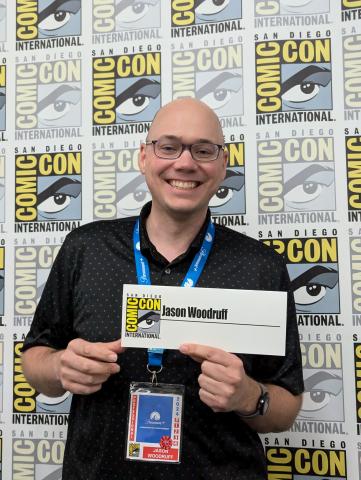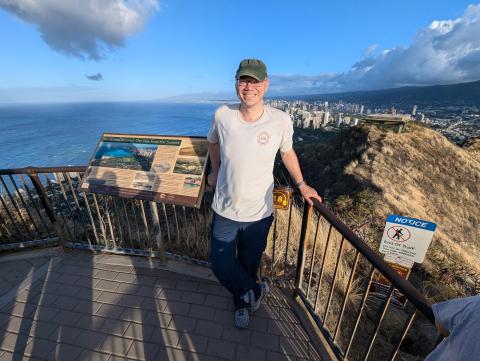
CPT Jason Woodruff: Bridging Military Service and Clinical Psychology

CPT Jason Woodruff showing off his nerdy side at ComicCon.
For Jason Woodruff, a PhD candidate in Clinical Psychology at PAU and active-duty Army Captain, understanding human behavior has been a lifelong journey shaped by his experiences in a military family. Having moved over 30 times throughout his life, Jason developed a unique perspective on human adaptation and connection.
"I was always interested in psychology because it is a measure of human connection and in understanding what people do and what makes them tick," Jason explains. "Moving so much, it was vital to understand how people think and how to adapt to different situations. Psychology is about adapting to individual clients in the same way I adapted to each new home."
PAU's strong connections with the Department of Veterans Affairs and its numerous facilities drew Jason to the program. "PAU has such a strong connection across the different VA hospitals," he notes. "We have externships with the Palo Alto VA, the San Francisco VA, and even the Northern Virginia VA." Jason is also grateful to have had the opportunity to work with faculty members like Dr. Bruce Bongar, Dr. Matt Yalch, and Dr. Lisa Brown, who share his research interests in veterans' affairs.
Balancing military service with doctoral studies presents unique challenges. "I am up at 4 AM and at work until 5 or 6 PM," Jason shares. "Fitting in dissertation research and self-care are hard but I am managing to make it work here in Hawai’i." He credits PAU's supportive environment, particularly Lisa Harris and the Student Veterans Organization, for helping him navigate the demands of his active duty service. “I made a lot of friends at PAU and in SVO that helped me better understand military life, what to expect, and how I could make an impact as a military psychologist.”
Jason's research focuses on trauma and risk assessment, and he is interested in future research with military populations. "Military populations have a disproportional suicide and violence risk compared to many other populations. So I am looking at how to help them with prevention programs or helping them recover after a suicide attempt," he explains. "My duty as a clinical psychologist in the military is to keep our fighting force strong."
Currently completing his internship at Tripler Army Medical Center in Hawai’i, Jason is gaining diverse clinical experience while maintaining his military duties. "I am currently on a neuropsych rotation where I am looking at things like ASD, ADHD, and traumatic brain injuries. I am also doing inpatient and outpatient work," he says. “All of these duties are on top of military responsibilities - so I am still doing PT in the morning and learning the duties of being a Captain."
Despite starting his program during the midst of the COVID-19 pandemic, Jason has found meaningful connections with his classmates and faculty members. "Being able to present at WPA and APA was really awesome and having faculty members seeing me as a colleague at these conferences was really unique and rewarding," he reflects.
Looking ahead, Jason plans to complete his post-doctoral residency at Tripler before advancing his military career. "After my residency, I will learn a lot more about leading in the Army through Officer Training and then I will become an Integrated Behavioral Health Officer who could get placed on a base anywhere from South Korea to Florida. I hope to continue my education by obtaining an Army fellowship in Health Psychology and working towards prescription privileges to become a prescribing psychologist."

CPT Woodruff in Hawai'i
Outside of his studies and military service, Jason maintains an impressive collection of hobbies. "I am a massive nerd. I love video games and board games. I think I have something like 390 board games and a room dedicated to them," he shares enthusiastically. "I also love hiking and swimming, so living on Oahu is perfect."
To other service members considering a psychology degree, Jason emphasizes the importance of utilizing available resources. "There are so many resources to help service members financially, mentally, etc. PAU and your local community are there to help," he advises. "Remember to go with the flow and be open to learn. Broaden your mind. Graduate school has highs and lows for everyone, not just service members."
Through his unique combination of military service and clinical psychology training, Jason exemplifies PAU's commitment to preparing diverse, well-rounded practitioners who can make meaningful impacts in their communities.
